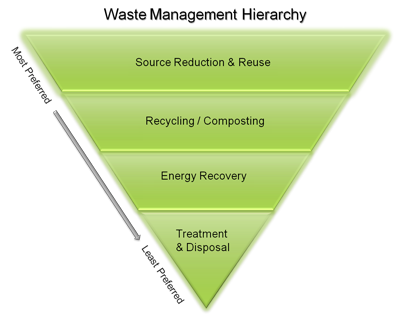Waste legislation
Waste disposal requires standardized procedures in accordance with the Environmental Management Act (Victoria: fair trading amendment, 2010). It is the responsibility of Transpacific to monitor, handle, evaluate, characterise toxic and non-toxic materials. As a result, Transpacific act on legislation that enforces waste management procedures for organisations, industries, and corporations. The waste disposal hierarchy provides steps to efficient waste disposal. Thus, the hierarchy evaluates collection schedules based on priority. The steps include prevention, reuse, recycling, energy recovery, treatment, containment, and disposal. Guidelines for waste disposal in Victoria must follow the hierarchy. The diagram below summarises the procedures for waste disposal in Victoria.

The EPA established sub-legislations that monitor and control the primary action. Thus, the secondary legislation or subordinate legislation derives its power from the primary environmental policy. Some sub-legislation includes Prescribed Industrial Waste 2009, Industrial Management Policy 2000, and Waste Management Act 1998 (EPA VICTORIA: waste management policies 2012). Waste materials at Woolworth plaza are managed by Transpacific Company. Waste materials are transported after sorting and classification. Trading hours begin at 7am and closes at 2 pm on weekdays. The organisation has a functional website, which is www.transpacific.com.au. Contact numbers are available on the website.
Transpacific
Transpacific was consulted to provide an environmental management plan (EMP) for Woolworth Plaza in Weribee. The EMP guides the organisation to ensure proper waste management and safety. As a result, the cost, techniques, risk assessment, and implementation plan will be highlighted in the environmental assessment report. Consequently, a waste disposal mechanism will be provided for the organisation. As a result, waste materials are disposed of in specific facilities. The company formulates contract clauses that comply with prescribed regulations on toxic waste disposal. Waste disposal is the primary responsibility of Transpacific Company. However, the company provides other services associated with hazardous materials. The services department is classified into the general waste disposal, hazardous waste disposal unit, industrial waste disposal and other waste disposal unit. General waste disposal services include recycling, compactors, bin disposal, and waste services. Industrial waste disposal services include pressure cleaning, emergency spills and hydro evacuation. Hazardous waste services include drum collection, oil disposal, and clinical waste. Other waste services include water waste management, site remediation, and industrial waste solutions. The company has an efficient staff strength that provides quality service.
Trained staff supervises the conduct and implementation of waste disposal services. Thus, Transpacific Company provides the best consultancy services for waste disposal. In accordance with the Waste Management Act, the company has the certification and requirements for waste disposal. As a result, the company handles disaster waste, e-waste, hazardous waste healthcare waste, integrated solid waste, waste plastics, agricultural waste, landfills, policymaking, and industrial waste. Waste materials are graded in accordance with the best management practice. As a result, some waste materials can be recycled, reused, or disposed of. Transpacific has different waste storage facilities to ensure proper disposal. As a result, the organisation has a waiting section that evaluates waste materials. Only certified personnel are authorized to handle toxic and hazardous waste. Thus, quality service delivery and environmental safety are guaranteed. Consequently, our landfill expansion plan guarantees a long-term waste management plan.
Transpacific has efficient landfill equipment to evacuate, manage, and control waste materials. The storage facilities have multiple compartments for long-term EMP. As a result, site containers are used for liquid storage. Liquid waste materials are handled in accordance with the Environmental Management Act. Traffic control at the facility prevents over speeding and traffic jam. Dumbtrucks are available at each storage facility to convey liquid waste. Waste documentation and clearance are reported in all transactions. In accordance with regulatory laws, Transpacific Company documents waste services and timeline for future use. Service payments depend on the nature of the waste material. Transpacific provides free services for electronics and computer waste. The organisation has fair charges on all service payments. However, the contract agreement will not require payment charge. The charges for services will be summarised below.
Transpacific is a major enterprise for waste disposal in Australia. The organisation has the required certification, land permit, and clearance documents for waste disposal. As a result, the organisation can serve 5000 clients simultaneously. Thus, business transaction within the organisation aligns with the objective of the EMP. The organisation combines different waste management strategies to fulfil each task. Thus, turnover efficiency is guaranteed. Waste streams are evaluated based on the environmental condition. The organisation provides services that suit different environmental conditions. Implementation guidelines for waste streams include disposal options review storage procedures, evaluate process inefficiencies, identify alternatives, and develop a suitable recycle plan.
The organisational structure and implementation plan for waste management satisfy the customer. I will recommend the company for clients that require quality service. Our organisation will benefit from the services of Transpacific Company. The quality assurance mechanism of the organisation aligns with our objectives.
References
EPA VICTORIA: waste management policies 2012. Web.
Victoria: fair trading amendment 2010. Web.